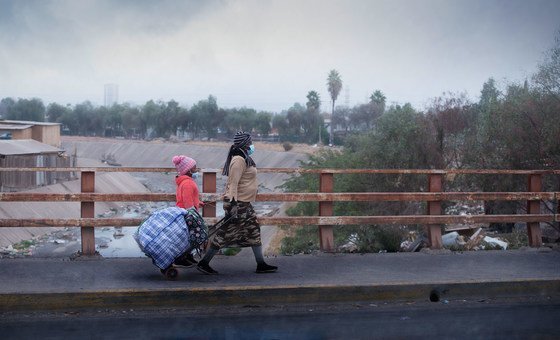Migrants must be allowed to stay in Chile while their cases are being individually assessed or risk “irreparable harm”, a group of UN-appointed independent human rights experts said in a statement on Wednesday.
In line with international human rights norms and standards, the experts called on the Government of Chile to immediately stop collectively expelling migrants.
“Deportations of migrants cannot be carried out in a summary manner but require a case-by-case determination of their international protection needs, taking into account humanitarian considerations of their family roots, social ties and other relevant circumstances”, said the Special Rapporteur on the human rights of migrants, Felipe González Morales.
Rights denied
Since February, hundreds have been expelled from Chile without an individual evaluation, or the possibility of applying for protection, in line with international human rights and refugee law.
According to the experts, the last incident took place on 25 April, when 55 Venezuelan migrants were collectively expelled from Iquique Diego Aracena Airport, in the country’s north.
And prior to their removal, some of the migrants were reportedly detained incommunicado and with no access to legal assistance.
“The absence of an individual assessment of protection needs and risk of irreparable harm of each migrant prior to their deportation increases the risk of further human rights violations, including a violation of the principle of non-refoulement”, Mr. González Morales said, referring to the fact that they may face persecution in their country of origin.
Follow due process
The human rights experts underscored that immigration detention can be used only as “a measure of last resort…for the shortest appropriate period of time and must be consistent with the principles of necessity and proportionality”, based on the individual circumstances of each case.
This is enshrined in the Convention against Torture and Other Cruel, Inhuman or Degrading Treatment or Punishment as well as other international human rights treaties. And it applies to all forms of expulsion, regardless nationality or migration status.
“It is also essential to comply with due process guarantees and to ensure that migrants have effective access to justice to make their claims against a deportation order, and that concerned migrants should be allowed to remain in the country while the merits of these claims are being resolved”, stressed the Special Rapporteur.
COVID request
In the context of the COVID-19 pandemic, Mr. González Morales and the UN Committee on Migrant Workers had previously called on States to consider a temporary suspension of deportations or forced returns of migrants, fearing that without proper health and safety precautions, they may be exposed to dangerous conditions.
Special Rapporteurs and independent experts are appointed by the Geneva-based UN Human Rights Council to examine and report back on a specific human rights theme or a country situation. Their positions are honorary and they are not paid for their work.
Click here for the names of all the UN independent experts who supported this statement.

